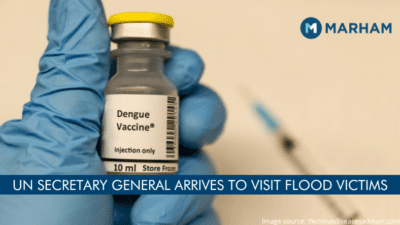Takeda’s dengue vaccine finally received its long-awaited initial approval last month, following more than a decade of study. After years of testing in Asia and Latin America, the Indonesian authority National Agency for Drug and Food Control (BPOM) has approved the vaccination for individuals aged 6 to 45.
The vaccine is known as Qdenga and can be used regardless of past dengue exposure. The license was given based on the findings of the company’s current phase 3 Tetravalent Immunization Efficacy Study (TIDES). It included 20,000 healthy children aged 4 to 16 living in dengue-endemic locations in Asia and Latin America.
According to Gary Dubin, president of Takeda’s vaccines business unit:
“Dengue can affect anyone living in or traveling to endemic areas – regardless of age, health and socio-economic circumstances. Developing this innovative dengue vaccine has been an exciting challenge, and its approval in Indonesia is an important achievement for Takeda and for public health.”
Dengue fever is unique in that a first infection is seldom fatal, but a second infection can result in a much more serious illness. According to Takeda, Qdenga has been licensed for use irrespective of past dengue exposure and may thus be given without the necessity for pre-vaccination testing.
Despite the greatest efforts of health officials across the world, dengue disease remains a major issue. According to Wallace, who has worked on the Takeda program for 14 years, the condition is now around 30 times more frequent than it was 50 years ago.
In an interview with Fierce Pharm, the program head, Derek Wallace said:
“I think we’re about to start a new chapter where we learn how best to use this vaccine with the existing dengue control mechanisms that countries are implementing. It’s a watershed moment in a sense of where we moved from developing a dengue vaccine in a pre-licensure setting to learning how to best use that vaccine to have the maximum impact on public health.”
The World Health Organization labeled dengue as one of the top 10 public health hazards in 2019, alongside climate change and other diseases. As a result, the business intends to market the vaccine in around 30 countries and make $1.6 billion in sales.
Takeda anticipates receiving further clearances in the near future. According to Wallace, the corporation has an aggressive regulatory plan and is pursuing simultaneous permits in many endemic nations.
Dengue fever is an epidemic in countries like Pakistan, where several outbreaks have been recorded in 2010, 2017, 2019, and 2020. Currently, there is an ongoing outbreak of dengue fever in Pakistan. Every day hundreds of cases are being reported in various cities of the country.
If Takeda’s Dengue vaccine gets further approvals, it could be extremely useful in ending the dengue epidemic.

